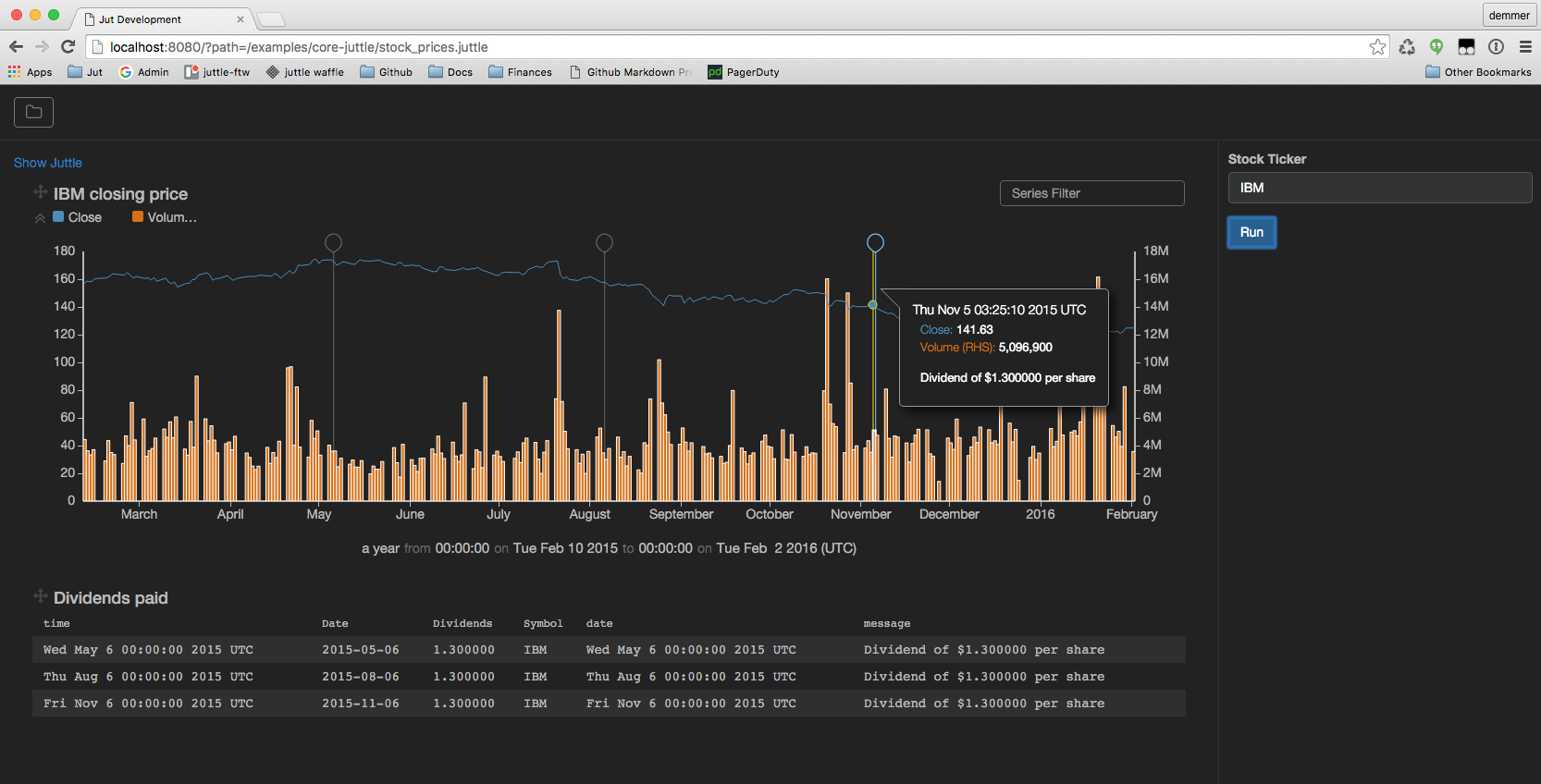Juttle Engine
Juttle Engine is an integrated environment for developing and executing juttle programs and visualizations. It lets you run Juttle programs stored on the file system and present the results in a browser for experimentation, development, deployment, and debugging of juttle programs.

To make it easy to interconnect analytics with visualization, Juttle promotes a tight coupling between the language and the client-side visualization library. Rather than having to tie together by hand a data processing layer with a separate visualization layer, Juttle enables you to integrate these two layers so you don't have to worry about the details of wiring Juttle dataflow computation to your browser-based views. Juttle Engine is the development and execution environment in which you can explore your data using Juttle and deploy rich visualizations into production.
Under the covers, Juttle Engine integrates juttle-service, a node.js API server that enables execution of Juttle programs using a REST API with the ability to serve web application bundles. It comes with the juttle-viewer application that provides a simple in browser experience for loading and executing juttle programs in the juttle-engine and rendering the results using the juttle-viz visualization library. In the future, Juttle Engine may be extended to support other application bundles.
Getting Started
Installation
Make sure you have node (with npm) installed.
Use npm to install Juttle Engine
$ npm install juttle-engine
This will install the Juttle Engine daemon and client binaries, the juttle interpreter, and the current set of supported juttle adapters.
We believe it to work with node.js 4.2.3 and 5.0, npm 2.14.17 and 3.5, and likely other combinations we have not tested against.
Running your first juttle program
Start the daemon by running juttle-engine:
$ juttle-engine -d -o juttle-engine.log
This will daemonize juttle-engine and output logs to juttle-engine.log. You can now run juttle programs against the juttle-engine daemon via the juttle-engine-client:
$ juttle-engine-client browser --path examples/core-juttle/hello_world.juttle
This will open a browser window and display the output of the program. You can make edits to your juttle, save the file, and reload the browser window to get the updated output.
Examples
Several demo-style examples of Juttle programs with sample data sets are available in this repo under examples. The same examples are deployed on a demo system demo.juttle.io.
We also offer a tutorial for developers new to Juttle.
Ecosystem
Here's how the juttle-engine module fits into the overall Juttle Ecosystem:
Options and Configuration
Here are the full command line options supported by the daemon and client programs:
juttle-engine
usage: [--port <port>] [--root <path>]
[--config <juttle-config-path>] [--daemonize]
[--output <logfile>] [--log-config <log4js-config-path>]
[--log-level <level] [--help]
-p, --port <port>: Run juttle-engine on specified port
-r, --root <path>: Use <path> as the root directory for juttle programs
-c, --config <juttle-config-path>: Read juttle config from <juttle-config-path>
-d, --daemonize: Daemonize juttle-engine and log to configured log file
-o, --output <logfile>: Log to specififed file when daemonized
-L, --log-config <log4js-config-path>: Configure logging from <log4js-config-path>. Overrides any value of -o
-l, --log-level <level>: Use a default log level of <level>. Overridden by any log level specified in -L
-h, --help: Print this help and exit');
juttle-engine uses log4js for logging and by default logs to log/juttle-engine.log.
juttle-engine-client
usage: [--juttle-engine <hostname:port>] [--help] [COMMAND] [OPTIONS]
[COMMAND]: one of the following, with the following options:
subscribe (--job <job-id> | --observer <observer-id>)
list_jobs [--job <job-id>]
list_observers
run --path <path-to-juttle-file> [--wait] [--observer <observer-id>]
delete --job <job-id>
get_inputs --path <path-to-juttle-file> --input name=val [--input name=val ...]
push --path <path-to-juttle-file> [--topic <rendezvous-topic>]
watch --path <path-to-juttle-file> [--topic <rendezvous-topic>]
browser --path <path-to-juttle-file>
[OPTIONS]: one of the following:
--path <path-to-juttle-file> Path to file relative to configured root directory.
used by: run,get_inputs,push,watch,browser
--wait If true, wait for program to finish, otherwise run in background
used by: run
--input name=val One or more input values.
used by: get_inputs
--job <job-id> Job id.
used by: subscribe,list_jobs,delete
--observer <observer-id> Observer id.
used by: subscribe,run
--juttle-engine <hostname:port> Hostname/port of server
--help Print this help and exit
--topic <rendezvous-topic> Rendezvous topic
used by: push,watch
Juttle config file
The Juttle compiler and runtime within juttle-engine are also configured via the juttle configuration file, typically at $(HOME)/.juttle/config.json. For more information on the juttle configuration file, see the juttle configuration documentation.
Module resolution
For information on how modules are resolved, see the "Importing Modules" section in the general juttle documentation on programming constructs.
Testing
To run unit tests:
gulp test
To check code style and perform lint checks:
gulp lint
Both are run automatically by Travis.
